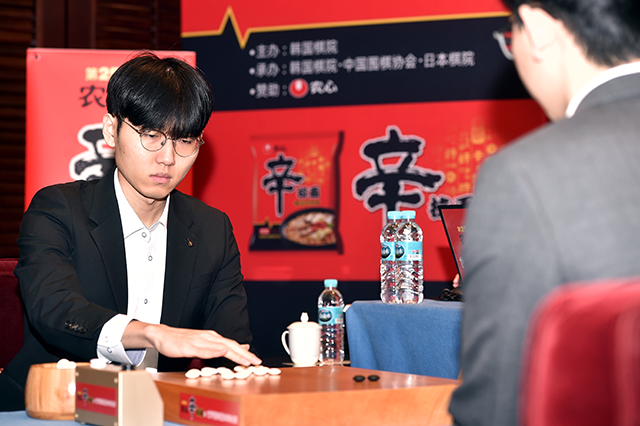
Shanghai, China – World No. 1 Shin Jin-seo (25) has once again achieved a "Shanghai Triumph" in the Nongshim Shin Ramyun Cup World Baduk Championship, a tournament considered the "Samkukji" (Three Kingdoms) of Go/Baduk among Korea, China, and Japan.
On February 21st, in the final 14th game of the 3rd round held in Shanghai, China, Shin Jin-seo (Korea) defeated Ding Hao (China), the last player for the Chinese team, by a white win after a fierce battle that lasted 242 moves.
With this victory, Korea achieved its 5th consecutive win in the 22nd tournament, and Shin Jin-seo set a new record for the most consecutive wins with 18 victories, surpassing his own previous record. In terms of total wins, he rose to 3rd place, surpassing Park Jung-hwan (17 wins, 10 losses) and following Pan Ting-wei (21 wins, 9 losses) and Lee Chang-ho (19 wins, 3 losses).
The Nongshim Shin Ramyun Cup is a national team competition in which the best players from China, Korea, and Japan compete in a winner-stays format. The prize money is 500 million won, awarded only to the winning team.
Korea, with its team members Seol Hyun-jun, Kim Myung-hoon, Shin Min-jun, and Park Jung-hwan, achieved a total of 5 wins. With Japan being eliminated early on, and the competition narrowed down to Korea and China, Park Jung-hwan suffered a shocking reverse defeat in the 12th game. This left Shin Jin-seo with the burden of facing both of China's top players, Li Xuan-hao and Ding Hao, alone.
Shin Jin-seo, the overwhelming favorite as the world's strongest player, has been particularly dominant in the Nongshim Shin Ramyun Cup. In the previous tournament, he achieved 6 consecutive wins, leading Korea to victory and creating the "Shanghai Triumph."
Shin Jin-seo was strong in this tournament as well. After defeating Li Xuan-hao in the 13th game the day before, he faced Ding Hao, China's de facto No. 1 player, in the championship decider. In the early stages of the game, the balance of power remained even. Shin Jin-seo, playing white, gained a slight advantage in the battle in the upper left corner as the game entered the middle stage.
However, he allowed Black to build a strong wall in the center, quickly losing the advantage. Shin Jin-seo, now at a disadvantage, attempted a desperate comeback with brilliant moves in the upper right and right sides.
Ding Hao tried to seal the victory by attacking White's stones in the center. However, Shin Jin-seo seized the opportunity from Ding Hao's hasty moves and succeeded in a dramatic comeback by capturing two black stones, the key points of the game, with an exquisite sequence.
The final battle was a ko fight in the lower right corner. In the fierce competition for ko threats, Shin Jin-seo lost the ko but gained a clear advantage by capturing a large group of white stones in the upper right corner in return. Ding Hao, realizing his defeat, continued to play for about 30 more moves before finally resigning.
With this victory, Korea claimed its 17th championship title in the Nongshim Cup, further widening the gap with China (8 wins). Shin Jin-seo's winning rate in the Nongshim Cup is 90%, making him the player with the highest winning rate among those who have played more than 10 games.
[Copyright (c) Global Economic Times. All Rights Reserved.]





























